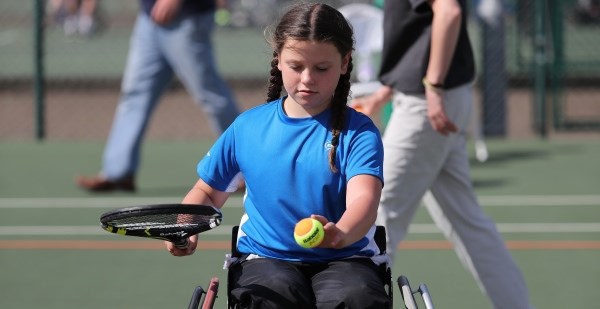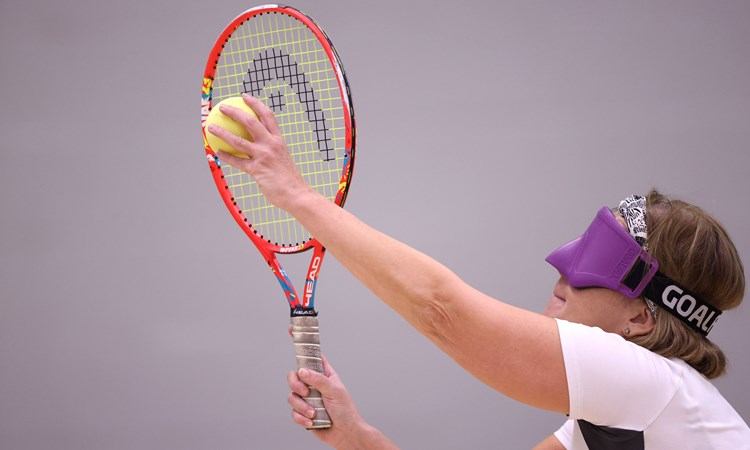
Report: The Positive Impact on Mental and Physical Health of Disability Tennis
• 4 MINUTE READ
Great Britain’s leading tennis charity, the Tennis Foundation, has released 'The Positive Impact of Disability Tennis', a detailed research report showing the combined mental and physical health benefits that playing tennis can bring to disabled people.
The report looks at the impact of disability tennis on players, their parents and guardians, coaches and tennis venue staff, and is the result of research undertaken by ComRes on behalf of the Tennis Foundation.
‘The Positive Impact of Disability Tennis’ report can be downloaded from the Tennis Foundation’s website. Key findings show that playing tennis can make disabled people feel more self-confident, happier and less isolated, as well as play a key role in keeping them more physically active.
DOWNLOAD REPORT: The Positive Impact of Disability Tennis

One of the most striking findings revealed by the research is that 91% of disabled players surveyed [1] said that tennis has had a positive impact on their self-confidence, demonstrating how much playing tennis can contribute towards improved mental wellbeing.
Other findings showed that 84% of respondents stated that playing tennis has had a positive effect on their social support networks and 89% said that it has had a positive impact on their day-to-day happiness. Since starting to play tennis, disabled players surveyed also reported feeling less bored (73%), less isolated (63%), less stressed (48%) and less tired (33%).
Alongside the mental health benefits, the role tennis plays in keeping disabled people physically active were also recorded, highlighting the accessible and inclusive nature of the game. More than a third of players (36%) would miss the Chief Medical Officer’s guidelines of doing 150 minutes or more high or medium intensity activity each week - excluding walking - if they were not playing tennis. Prior to playing tennis, a third (32%) of respondents were not playing any other sport at least once a month, indicating that starting to play tennis may have moved these players from inactivity to activity.
The research highlights and supports the Tennis Foundation’s belief that tennis can bring a range of physical, mental and social benefits, and can be used as a vehicle to help individuals realise and achieve their personal potential through sport.
This research shows that the work we are doing is having a genuine impact on people's lives
Geoff Newton, Executive Director of the Tennis Foundation, said: “We are delighted that the research findings from ComRes support our already strong belief that tennis has real health and social benefits for the people who play it.
“At the Tennis Foundation, our aim is to inspire and engage disabled people to become involved in tennis, regardless of background or ability. At a time when more disabled people than ever before in Great Britain are playing tennis at our supported venues, this research shows that the work we are doing is having a genuine impact on people’s lives. It gives us further impetus to continue delivering funding, equipment, training and advice to venues across the country to ensure more disabled people can pick up a racket and enjoy the sport and the benefits it can bring”.
The research also looked at the benefits that can be gained from coaching disabled people, and the motivations behind the decision to do so. 98% of coaches surveyed said that coaching disability tennis had a positive impact on their ability to coach generally, with 71% saying that the reason they coach tennis to disabled people is to develop and challenge their coaching skills. Three quarters (77%) of coaches said it has had a positive impact on their personal wellbeing, while 89% of those surveyed said coaching disabled people has increased their involvement with the disabled community.
In terms of tennis venues, the research showed that the vast majority of tennis venue staff are confident in engaging with customers with a disability – whether that be a physical, visual or hearing impairment, learning disability, mental health problem or behavioural condition.
The findings revealed in ‘The Positive Impact of Disability Tennis’ report help to demonstrate the impact of the Tennis Foundation’s work to make tennis a sport which is inclusive and accessible to people from every community. The charity works to open up tennis to its priority audiences of disabled people, young people in education and people in lower socio-economic communities, making it possible for them to enjoy the many health and social benefits of the sport whilst maximising their potential.
As part of its disability work, the Tennis Foundation supports venues, coaches and players across the country by providing opportunities for disabled people to play tennis in an inclusive and accessible environment.
Find Your Nearest Disability Tennis Session
More disabled people than ever before are playing tennis at our network of venues. To find your nearest tennis session that caters for people who have a disability, click here.
[1] Statistics are taken from Tennis Foundation and ComRes Survey of Players, August 2016. ComRes surveyed 127 tennis players and parents of tennis players, 97 coaches and 45 venue staff online – all involved in the Tennis Foundation network - between 24th May – 24th June 2016. Full data tables are available at www.comresglobal.com.





